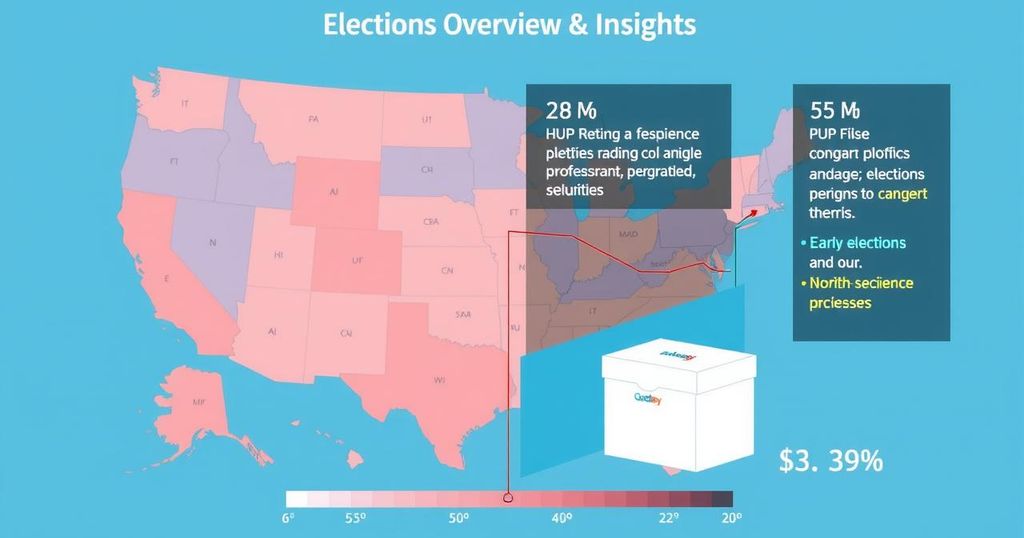2024: A Landmark Year for Global Elections and Democratic Participation
The year 2024 marked a historic electoral milestone, with approximately 3 billion people voting in 73 countries, emphasizing democratic engagement. However, significant challenges persisted, including declining trust in institutions, rampant disinformation, and underrepresentation of women and youth. Political upheaval characterized the elections, with notable shifts towards inclusive governance, despite ongoing threats to electoral integrity. Overall, 2024 showcased both the resilience and vulnerabilities of democratic systems globally.
The year 2024 represented a historic apex in electoral participation, with nearly 3 billion individuals casting their votes in 73 countries, marking it as the largest election year documented to date. This unprecedented engagement spanned local and national elections, impacting the political landscape globally. For many citizens, it signified their initial encounter with democratic processes, showcasing the inherent inclusivity of democratic systems. However, significant challenges loomed over this historic turnout, as numerous citizens expressed a sense of detachment from the decision-making processes, with two-thirds perceiving their voices as unheard within political structures.
Trust in democratic institutions continued to dwindle, fueled by the proliferation of disinformation, political polarization, and the misuse of state resources by incumbents striving to preserve power. Social media and artificial intelligence played a dual role in this era—while serving as platforms for civic engagement, they also facilitated the spread of misinformation, thereby casting shadows on the integrity of elections through means such as deepfakes and microtargeting.
Dubbed the “super election year,” 2024 saw a notable wave of political upheaval, with voters frequently dismissing incumbents perceived to be disconnected from their constituents. Far-right movements gained momentum in nations like France and Germany, capitalizing on economic discontent and cultural rifts, although centrist coalitions effectively obstructed their ascendance.
The integrity of elections was frequently undermined by irregularities, such as vote-buying in Serbia and voter suppression tactics, exemplified by the new voter ID laws in the United Kingdom. Despite these setbacks, encouraging signs of democratic resilience emerged. In Africa, younger leaders began to rise in prominence, symbolizing a shift toward more inclusive governance practices.
However, the data underscore both gains and persistent barriers in women’s political representation. Noteworthy advancements were achieved in Mongolia, which experienced a seven-percentage-point increase in women’s parliamentary representation thanks to a newly adopted gender quota. Nevertheless, significant declines occurred in regions like Bhutan and Belarus, indicating the uneven nature of progress in women’s political empowerment worldwide.
As the landscape of 2024 elections unfurled, the complexities of global democracy became increasingly evident. The dual narrative of progress interwoven with vulnerability characterized modern democracies. This year highlights the pressing need for reforms and innovative approaches to restore public confidence in democratic institutions while addressing the multifaceted challenges posed by economic disparities, social fragmentation, and the manipulation of digital tools affecting electoral integrity.
As the backdrop to the events of 2024, global democracy is facing both significant challenges and unique opportunities. The rise of disinformation, coupled with political polarization, has fostered a climate of mistrust in democratic institutions. Additionally, persistent economic challenges, compounded by post-pandemic realities, have fueled voter discontent and anti-incumbent sentiment. The elections in 2024 have been termed a “super year” due to the unprecedented number of voters engaged in the democratic process and the sweeping electoral changes experienced across numerous nations. These elections not only spotlighted the strength of democracy but also underscored the systemic barriers limiting political representation in terms of gender and youth.
The 2024 election cycle illustrated the dynamic interplay of progress and fragility within global democracies. With nearly 3 billion votes cast, this historic participation highlighted the potential for democratic systems to effectuate change. At the same time, entrenched challenges such as disinformation, institutional mistrust, and representation gaps remind stakeholders that substantial work remains. The lessons from 2024 can serve as a pivotal foundation for fostering democratic innovation and enhancing citizen inclusivity going forward, amplifying the voice of the electorate in shaping the future of governance.
Original Source: anfrel.org




Post Comment